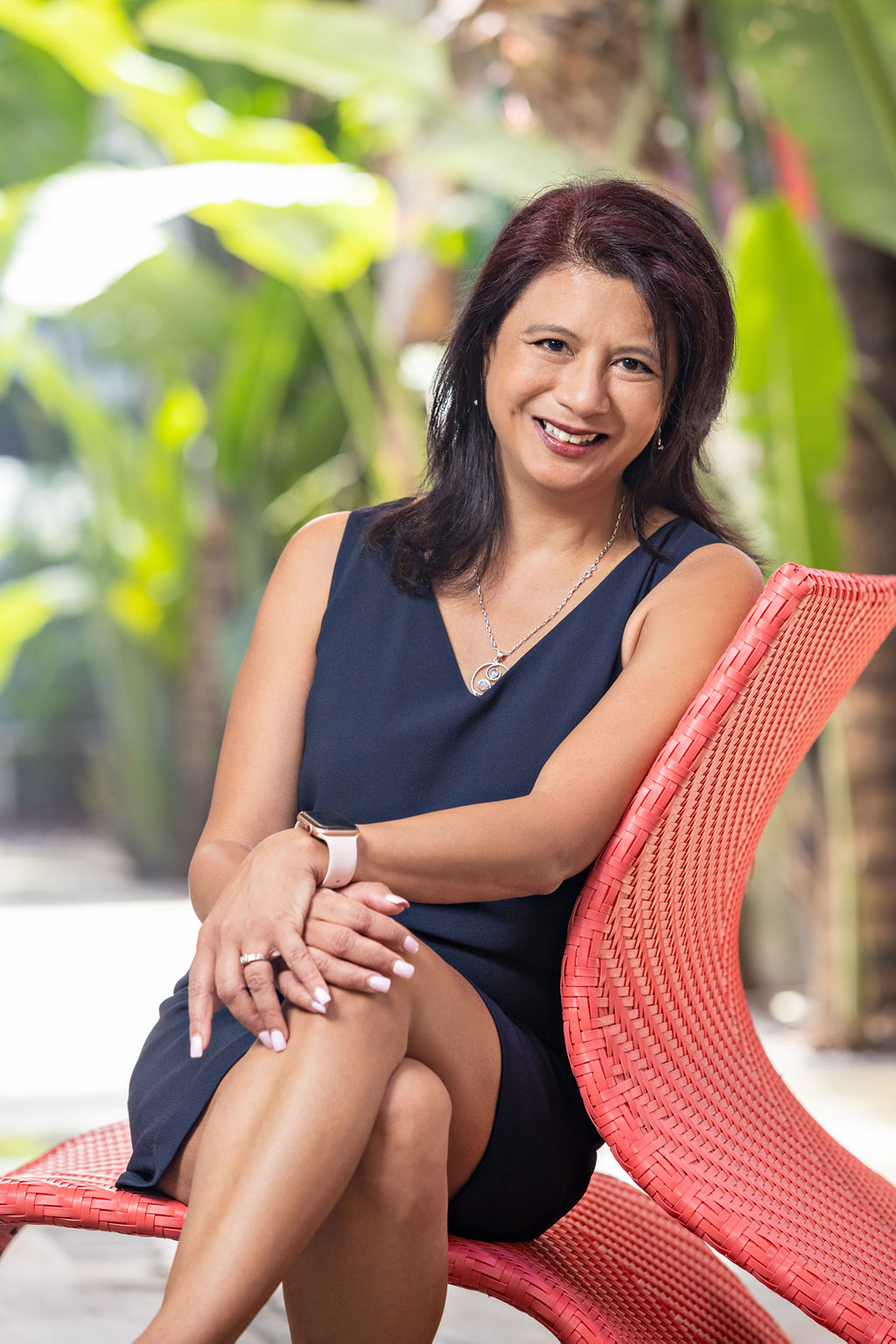Vietri, the largest U.S. importer of fine Italian and handcrafted ceramics, celebrates 40 years
A tavola non s’invecchia. (At the table, one does not grow old.)
What do Americans from the South and Italians have in common? “La tavola”! A beautifully set table with great food (and wine) and, of course, with friends and family. To Susan Gravely (the founder and CEO of Vietri), that’s good ol’ Southern hospitality, Italian style — and simplicity is key! Raised in a family that welcomed foreign visitors, Susan was always curious about the world. A trip to Italy led to a love for Italy and fine Italian ceramic dinnerware. And, from a young age she was determined to share her passion for “la bella vita” with other Americans.
Vietri, the company which she co-founded and is CEO is this year celebrating its 40th anniversary. We chatted with Susan about her professional journey, love for Italy and its people, and her latest book “Italy on a Plate”.
Follow us on Instagram to learn how you can enter to win a copy of Susan’s book. In bocca al lupo!
(2:30) Where are you from?
I am from North Carolina. I was born, raised, and went to college in the eastern part of the state. My husband and I live in Chapel Hill where the university is.
There are people from all over the world who move here and some Italians as well. We love it!
(3:23) Talk about the beginnings of Vietri and then the book.
It is a very serendipitous story that goes way back. My father was a third-generation tobacconist. Being from the south it meant that you were either a farmer or you sold tobacco. So, we grew up with lots of foreigners in our home from everywhere. Like Zimbabwe, Saudi Arabia, Egypt, Russia, France, Italy, you name it. We, as children, were able to be seen, but not heard (unless asked a question.) We served drinks at the table and the different types of cigarettes that they were talking about.
Daddy always said: “You are only a phone call or a plane ticket away from seeing a bigger world, and the world is so small.”
That was my upbringing. We traveled a lot.
My Dad had a weak heart, so sadly he had a heart attack and died at age 60.
My first trip to Italy was with my sister and mother. That was in 1982 and the trip, the seed that began our company [Vietri].
(5:53) This was a mixed emotion journey.
It was. It had been two years. I was at the New York School of Design and my sister had just had her second baby. From that invitation until the time she died, she said if you can’t travel better than you live at home, then why travel. That trip was very special. We met a very important Italian man on the airplane.
The first big event that inspired Vietri was when we drove to the Amalfi Coast. We stopped at this little chapel and walked around it through herb covered borders of beautiful rock. We went on an elevator down about ten floors through the rock and the door opened to this hand-hewn enormous room with white cotton furniture and dark floors overlooking the Tyrrhenian Sea. Turning left following check-in we saw the dining room. Bougainvillea on the ceilings and peach tablecloths. There was an assortment with all different ceramics with animals and flowers. The colors were very Amalfitano. That was the San Pietro Hotel.
Susan’s First Love
(8:09) And there I had my first falling in love. It was for the dishes. So, we ended up spending three days with an Italian driver who spoke English. We were advised to design and distribute because we loved the design aspects so much. We didn’t know anything about starting a business. I had a Master’s Degree in child development and my sister was in industrial design. We had seen tobacco being hauled overseas, so we knew that somehow there was a way, and we were going to do it. That was the beginning of the company.
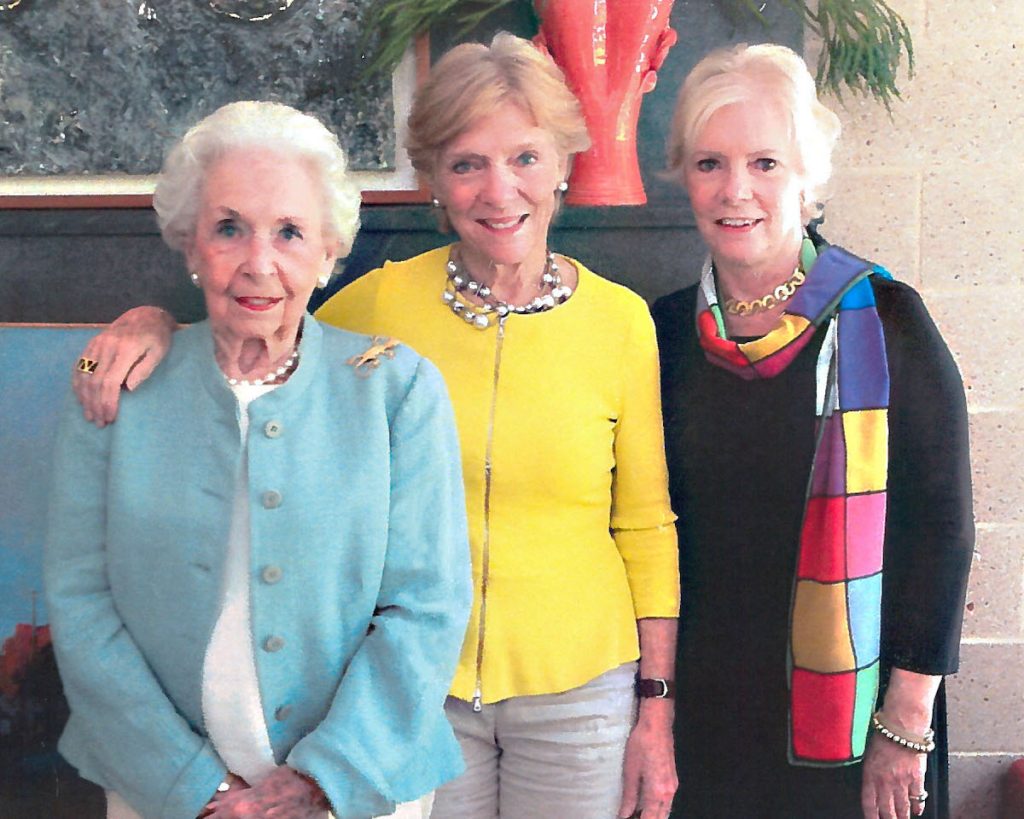
Your advice to young women who hope to start their own business.
(9:36) I say that to a lot of young women who ask how do I do this? I always say, first off ‘do it’ and ‘try it’. Know what kind of financial investment that you can make and lose if it doesn’t work out. Many start-ups don’t. Then get a notebook or iPad and start planning meetings with as many people as you can about what you want to do. Then begin. It’s either work or not but take you to the next step. The greatest thing is not to be afraid. Now be afraid. I’m afraid every day of my life, but I believe that the day you stop feeling nervous, you stop learning. There is that energy of questioning if you are doing enough and going in the right direction. But it’s okay. That is the energy that keeps you going as long as it doesn’t block you.
(11:25) Besides everything that led to Vietri, what else struck you about Italy?
I traveled a lot. At the time I was 31 years old, but I’d never been to Italy. I think somewhere deep inside I was a little afraid to go. Italy was never at the top of my list. However, when I got there (and being southern), Italy was about relationships, talking, communication. What did the day look like, the smells, deciding what to eat. It was never about what you do for a living –something that Americans ask first. It was about the person. I think that is one of the zillions of things that makes Italy the place where Americans feel that they’ve been there in another life (or their ancestors), or it was just their special place.
(14:35) What generally are people looking for in Italy?
I think they find a connection to the earth, environment, people and communicating openly. Then, space and freedom to explore what they love about life. Visitors also find a way to relax and be themselves and not be afraid to be who they are. I meet lots of Americans who are living in Italy or spending a lot of time there. You know that it’s the number one travel country this year.
There’s a twinkle in their eye. I’ve never heard anyone say, “I can’t wait to go back!”
(17:04) Are there similarities between southern hospitality and Italian hospitality?
Absolutely! I think that is one of the reasons that the pull for me is not only the artisans, but it’s the world of Italy. As a southerner, the similarities are that we love people, are kind overall, and enthusiastic. The table is not just eating and laughing, but the metaphor of gathering together. At the end of that experience feeling happier and having learned something. Knowledge is very important to the curiosity of Italians and southerners. I think the one difference is that in the south, I’ll meet you and immediately like you. Then if nothing develops, we won’t become friends. Italians do the opposite. They meet you and it takes a few times of truly meeting and connecting before they’d invite you to their home.
Being invited to a home where southerners do it immediately. For Italians, once you are invited to their home, you are a friend forever. They are loyal and faithful – you are brought into the family. I’ve been called Zia by so many people and that is such a compliment!
I have the keys to two different towns and that’s a huge honor because I’ve been in those villages a lot and love what the craftsmen do.
(20:45) Vietri is Huge!
It’s huge, yes. We were just at the Atlanta trade show and there was three of us who have had companies for 40 years. We buy everything for the table: dinnerware, ceramic, glass, napkins, flatware, linens, decorative accessories for the house and garden. We’re always looking for new vendors.
The beauty of the artisan is the work of their hands, and the hands express their soul – you can see that in their eyes.
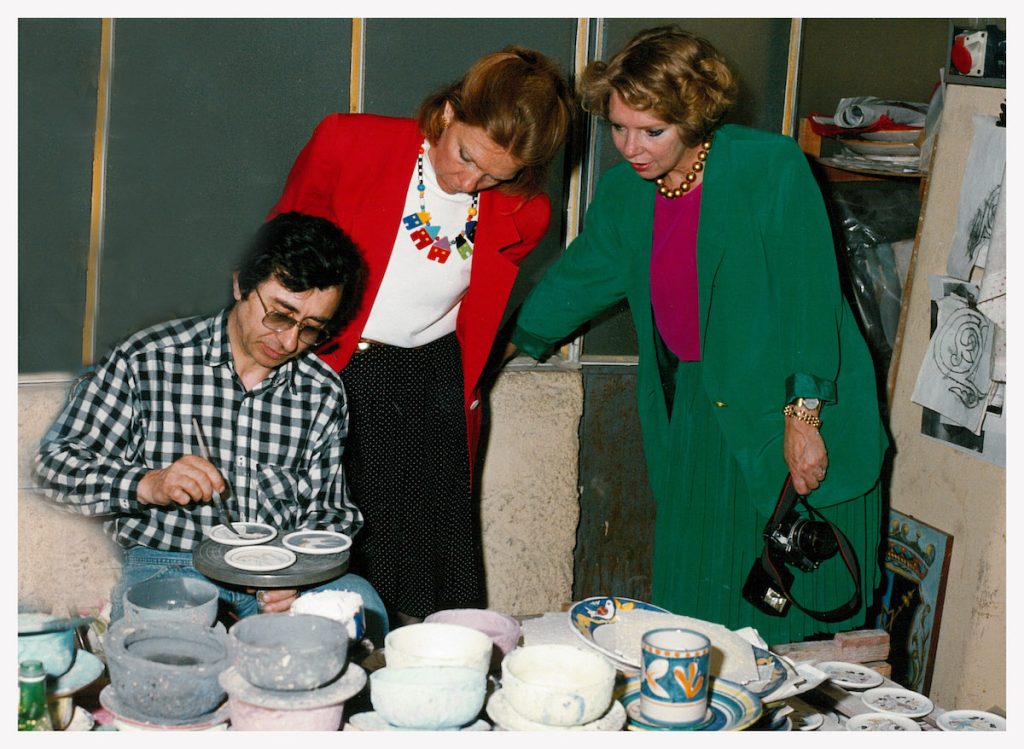
(24:36) What was the challenge of bringing something handmade to the U.S.?
I didn’t think in those terms. It was about a $20,000 investment and a factory that I fell in love with – working with them and creating a couple of our own designs. Respecting what they had done historically for the Amalfi Coast, and then sharing it. We found out about trade shows. The first one was completely booked up with a two-year waiting list. I talked myself into meeting a manager in New York. Then Neiman Marcus was at the first show and made a $12,000 order. They’ve been our account for forty years. It was about finding this first vendor and realizing that more needed to be created to meet demand. Then I decided to study Italian in Taormina. I would leave class at 1:00 pm and then look for factories with Fabio [Susan’s first agent who is introduced in her book.] That was what I kept doing.
We stayed the same in mission and look – classic Italian look, no decals, and all handcrafted. We decided that we would never copy or buy in China. Italian products are our niche and I think that’s why we’ve been so successful.
(26:00) Are you fluent in Italian?
Yes, I speak Italian with a southern (American) accent! I still keep a notebook and am always writing down new words. You learn by keeping contacts for a rainy-day moment.
(26:36) We started with a board of directors. My father had died, and I was going to be the president. I was three years younger than my sister. I was upsetting the family dynamic within a corporation. That wasn’t easy so I wanted to be accountable to some people.
I think it’s always important to be humble and to ask questions because people know a lot.
(30:35) Tell us about your experience of being a female business owner.
I think it’s how you approach being a woman, the confidence you have, and the way you know how to combat someone who is not going to be supportive, and not taking that personally.
(31:00) “Italy on a Plate”
For years I’ve been asked to write books. I’ve written five children’s books based around an old St. Nick dinner line. It was lots of fun and one of my ceramic artists did all of the illustrations. I knew how to do it. But for this book I sat down and started making a list of all the people who had been really important in these forty years and very instrumental in my development. I narrowed it down to eight. They are in different parts of Italy. I decided that the book needed to be memoirs and stories about how I got to know these people. It was their recipes and what I had eaten with them, and those things that bound their families.
Once I wrote these eight passages, I called them to let them know what I was thinking about doing. We hired two fabulous (female) Italian photographers who really understood what I wanted to do, plus a stylist. Then, went around to these people’s homes or businesses and shot photographs of being together, talking, and their families. We together chose the best recipes. Suddenly this book came about.
One important person in my life has been Frances Mayes who wrote “Under the Tuscan Sun”. She and her husband Ed live half of the time in North Carolina close to Bill and me, and half in Cortona. She said, “don’t go with a publisher. You need to self-publish so you can control the look of the book.” Our senior graphic designer took this on, and we’ve put this book together. The food was on Vietri dishes, so we could tell a 360-degree story.
It’s gotten a wonderful response.
(36:00) Was it important to highlight regional food?
Absolutely – one thousand percent! Italians are proud of their region. They’re proud that they have fresh fish everyday (for example). Also, they love their wines and love to talk about the vineyards and types of grapes.
Italians are proud to be Italians!
I tell people that they should ask their waiter what is regional and for his favorite dish rather than look at the menu. You will never go wrong.
Another thing about Italian cooking is that if you have the main ingredients, you can make almost anything. Everything is so simple and that’s one of the beauties of this book.
(37:42) What is your go-to meal when you are at home?
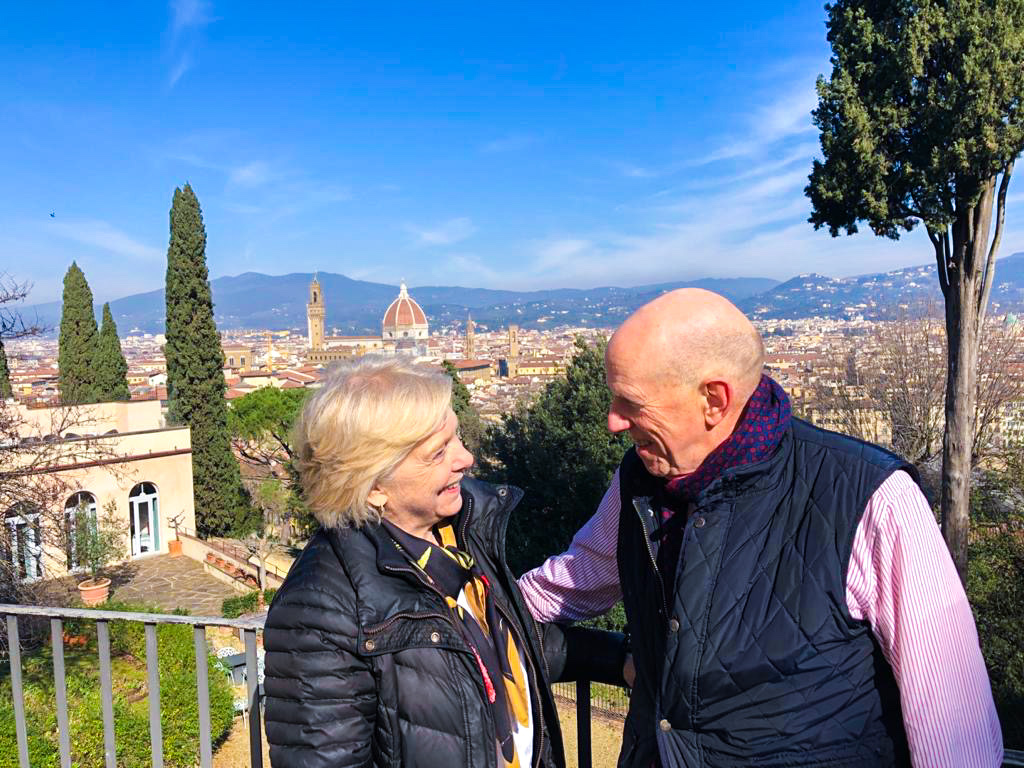
Keep it simple and don’t get stressed. Use what you have in your kitchen. Mix your dinnerware and the glasses. Add flowers from your garden or the grocery store and put them in different vases. The beauty of being together is just that – being together! People don’t care about it being formal or perfect.
My go-to now is Fish in Crazy Water (Pesce all’ Acqua Pazza) because it is so delicious and is a one-pan dish with capers, tomatoes, and olives. It’s in the book and is divine!
I also make these cookies that you can find in the recipe in the book too: Shortbread with Orange and Sage. The sage brings it to life.
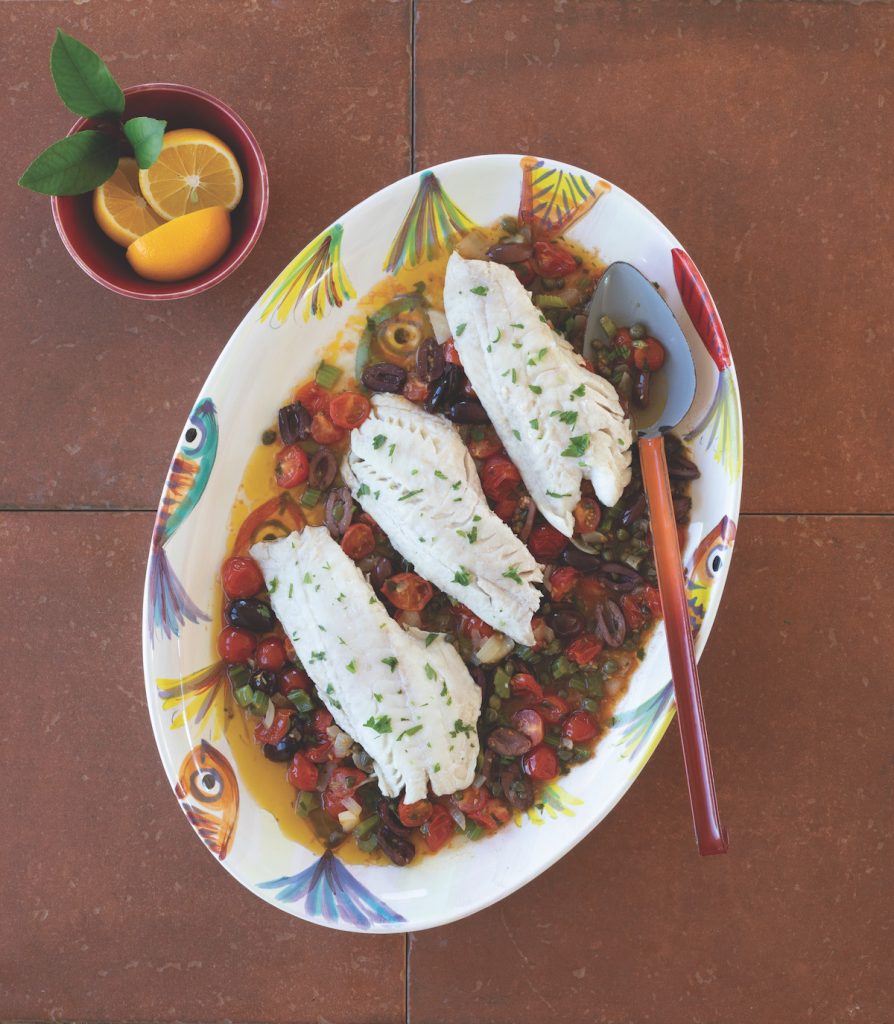
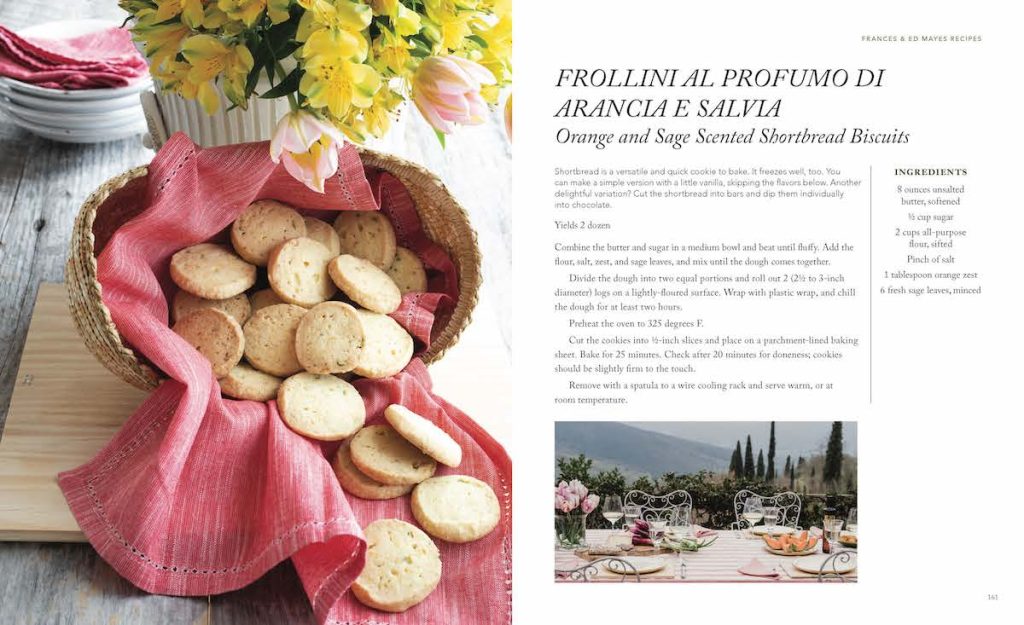
You don’t have to have three courses – just have a one-course meal.
(39:00) How to make a table beautiful.
Yes, but it’s what is fresh right then. Bring out what you own like formal dinnerware with ceramic and mixed glasses. Mix it up and show how you express yourself and what feels happy for you. It’s just so easy.
(40:00) What do you say to young families to encourage them to have a nicely set table?
It’s just as easy to use your plates and wash them all as it is to go and buy paper plates, bring them back, and then throw them away. Ceramic and stoneware have a feeling. It’s a part of the meal. What I love about Italian ceramic is how it feels – the glaze, unevenness, and the way that colors come up. Use white dishes and add a sprig of oregano and thyme and tie it onto a napkin to get the smell. Try to create what feels like you and that speaks volumes when being in someone’s home.
(42:00) How do you define authentic or slow travel?
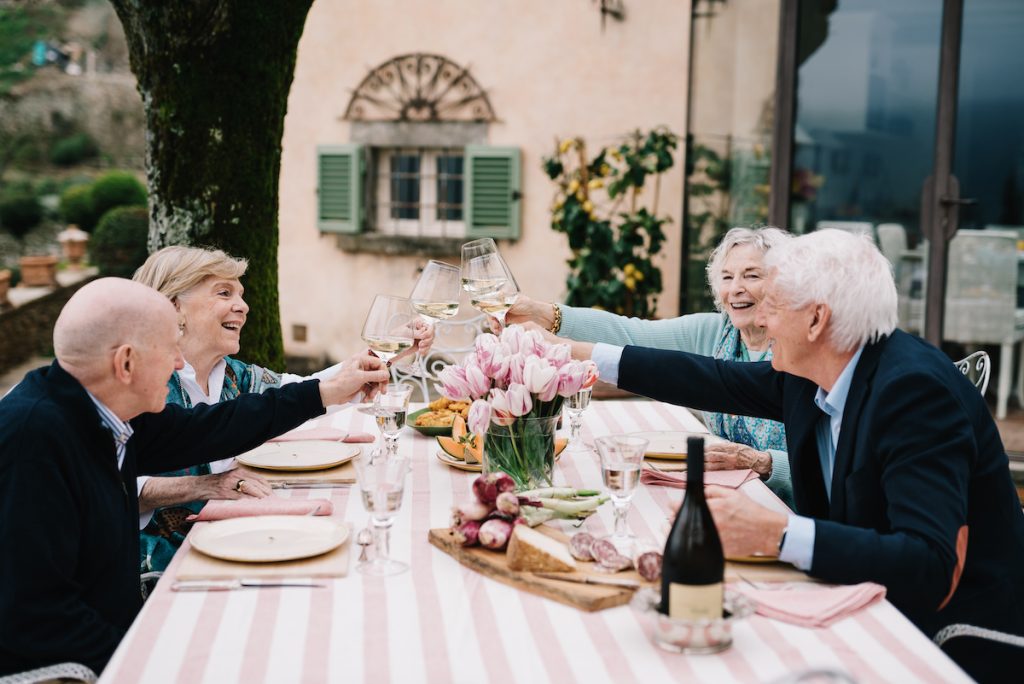
I would define it as going to one place or two maximum and just enjoying that surrounding. Walk into the little bread shop and smile. Take the time to experience fewer places more deeply. Then you will return next time to go someplace else. My mother would say, “always have something in your mind that you look forward to.” For you, me, and your listeners (readers) it’s about Italy and where’s the next place.
I get asked all the time, “where will you go next” and respond by asking them “where will you go next?”
Read an article and if it sounds good, go. Every place has some similar values, but it’s different. Just go to one and roam around that space.
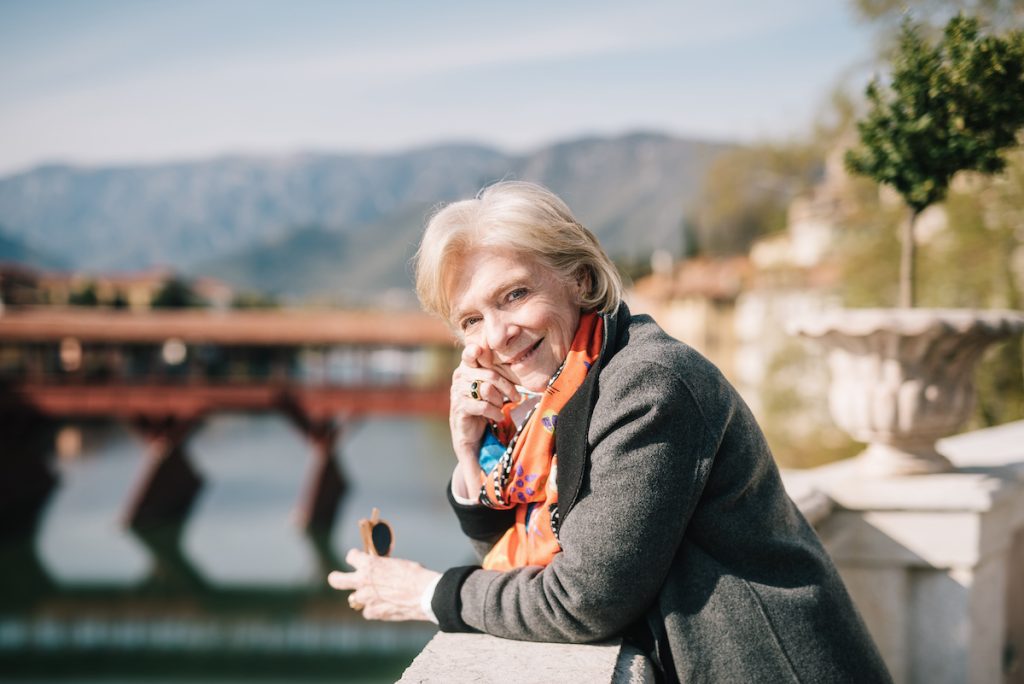
(44:00) What is your special place in Italy?
I think it’s Florence because I work with so many people in Tuscany. It’s a walking city and I can get lost by going on backroads. It’s central so it’s easy for me to go to factories, but also easy to become mindful of my surroundings. Bill and I rent an apartment every year from January to March in Florence. I read and rest better there because my senses are full.
(46:00) What do you envision for Vietri in the next two decades?
I see this incredible young generation like my 39-year-old president and managers who are from 26 to 42, expanding into other Italian lines. For me, I think I’ll write more books and I will always mentor the Vietri team and others. I see more people being less stressed about eating around the table. Italy will be a vital part of my life and everyone who I’m with for more than two more generations.
Enter to Win
“Italy on a Plate” Giveaway! Here’s how you quality to win a copy of Susan’s latest book:
- FOLLOW @liveinitalymag, @susanegravely, and @vietriinc on Instagram.
- TAG a friend in a comment under our giveaway post(s).
- SHARE the post on Instagram and tag @liveinitalymag & @susanegravely to your Stories for a BONUS entry!
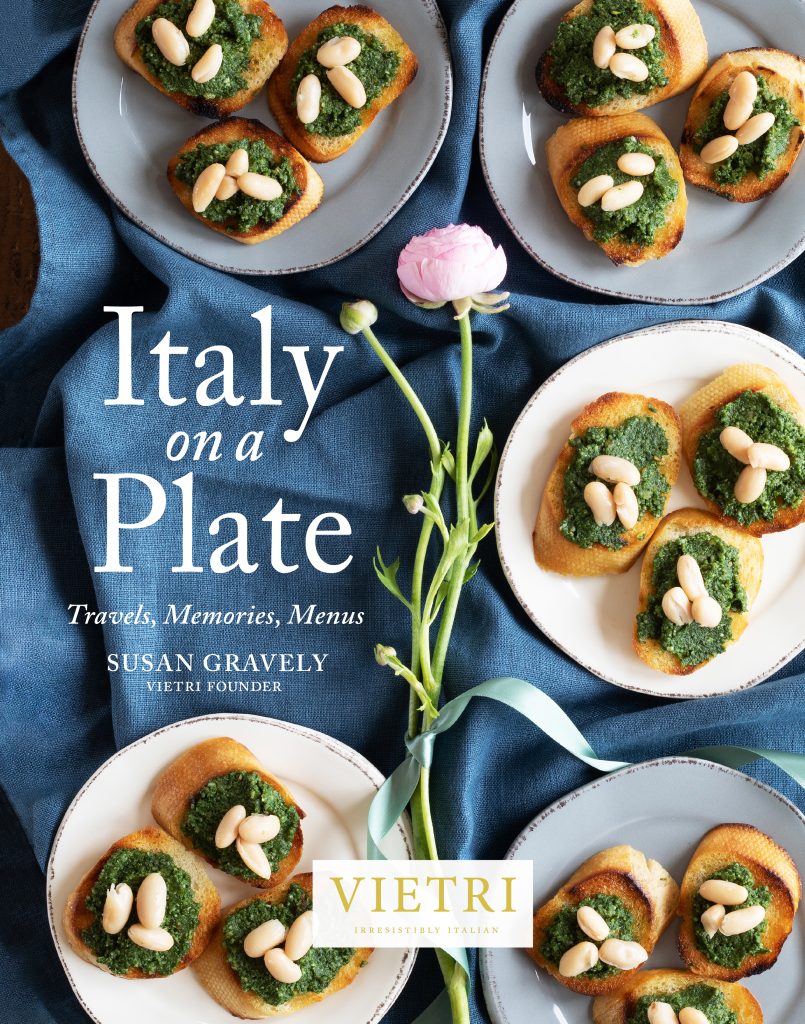
Connect with Susan
Website
Buy “Italy on a Plate”
Vietri
All images provided by Vietri for “Italy on a Plate”

